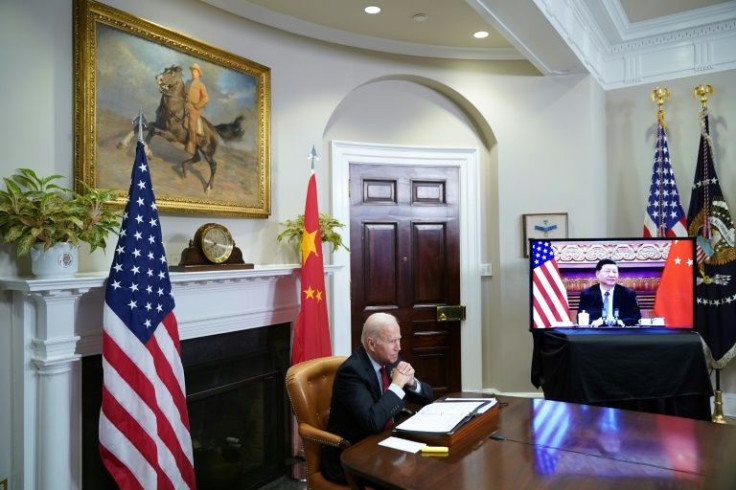Key Takeaways From The Xi-Biden Summit
Chinese President Xi Jinping and US counterpart Joe Biden held a virtual summit Tuesday, aiming to stabilise ties as tensions soar over Taiwan, human rights, and political and economic competition.
After exchanging cordial greetings, leaders of the two rival superpowers had what Beijing described as a "frank, constructive" discussion that lasted over three hours with the wider aim of avoiding conflict between the world's top two economies.
Here are four main issues they did -- and didn't -- discuss:
The topic of "extended discussion", according to US officials, was Taiwan: a self-ruled island democracy claimed by China which lives under the constant threat of invasion by its larger, more belligerent neighbour.
Biden said the US "strongly opposes unilateral efforts to change the status quo or undermine peace and stability across the Taiwan Strait", referring to China's ramped-up displays of military force and verbal threats.
The White House also reiterated longstanding US policy that does not recognise Taiwan's independence but supports defence of the island.
However, Xi chided Taiwan's efforts to bolster support among US politicians and compared encouraging independence to "playing with fire".
"If 'Taiwan independence' separatist forces provoke us, coerce us or even cross the red line, we will have no choice but to take decisive measures," said Xi, in a not-so-veiled threat of conflict.
China's foreign ministry reiterated Tuesday that it "does not have any room for compromise" on the Taiwan issue.
That means no resolution to the thorniest of issues between the rival powers.
Both sides' fundamental positions on Taiwan are "still in serious conflict," said Shi Yinhong, director of Renmin University's American Studies Centre and a government advisor.
"But this summit has further consolidated both sides' awareness of preventing military conflicts over the Taiwan issue."
Rights advocates had hoped the US would strongly criticise China's abuses in the Xinjiang region -- where it is accused of carrying out genocide against Uyghur Muslims -- Tibet and Hong Kong.
Biden expressed "concerns" about these as well as broader rights questions, but the official US readout of the talks did not elaborate further.
Uyghur activists are calling for a diplomatic boycott of next February's Beijing Winter Olympics in response to China's human rights abuses. But neither leader mentioned the Games, according to official readouts.
Instead, more time was devoted to discussing Taiwan in addition to US-China ties, regional security issues, climate change, energy security and the Covid-19 pandemic.

"We do not approve of interfering in other countries' internal affairs through human rights issues," said Xi.
The theme threading through the talks was the need to avoid competition spilling into conflict.
Speaking to Xi, Biden said it was their "responsibility as leaders ... to ensure that the competition between our countries does not veer into conflict, whether intended or unintended."
"We need to establish some common sense guardrails," he said, adding that the US aims for "simple, straightforward competition".
Xi also stressed the need to "prevent China-US relations from derailing".
"Non-conflict and non-confrontation is the bottom line that both sides must adhere to," said Xi, adding that he hopes US policy on China can return to a "rational and pragmatic track".
Xi also expressed a desire to keep in touch with Biden and emphasised various areas of potential bilateral cooperation.
"High tensions have not significantly de-escalated" despite renewed dialogue, said Shi.
"Competition is (Biden's) main implication, without turning into open conflict. This further prevents war between China and the US, but allows for further competition with China in all fields."
China and the US have sparred on trade and technological competition since the Donald Trump administration, with tariffs placed on billions worth of Chinese goods and Chinese high-tech firms blacklisted from accessing US supplies.
Biden, who has maintained many of the Trump-era tariffs, raised "the need to protect American workers and industries from (China's) unfair trade and economic practices".
US authorities have long complained that Beijing's massive state firm subsidies, weak intellectual property legislation and harsh restrictions on foreign firms create an uneven playing field.
In a concession to the US business community, Xi agreed to implement an upgraded "fast track" for US businesspeople to make it easier for them to come to China, given strict Covid entry restrictions.
However, neither readout mentioned pressing economic issues such as supply chain shortages, inflation and the possibility of easing tariffs.
"Today's meeting suggests that China and the US want to stay focused on turning their respective domestic economies around," said Raymond Yeung, a chief economist at ANZ Bank.
"The summit paves the way for subsequent trade negotiations, during which the US may soften its trade measures against China."
© Copyright AFP 2024. All rights reserved.











